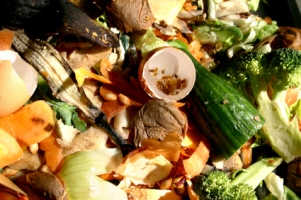Waste Not, Want Not

A striking number – about 30% of world’s food – is thrown away, according to a study authored by the Stockholm International Water Institute, the UN Food and Agriculture Organization, and the International Water Management Institute in 2008.
According to the same study, there is more than enough food produced in the world to feed a healthy population, but the distribution and access to food is the problem. In poorer countries, the efficiency of getting the food from the field to the table is poor and more than half of it is lost before reaching the consumer.
In richer countries, the problem is food waste. When you toss leftover food, you don’t only toss the food, but also the resources used to grow, ship and produce the food. “Waste not, want not” may sound like an old-fashioned saying, but rings true on a global scale. Another side effect of food waste that ends up at landfills is methane, a greenhouse gas 21 times more potent than carbon dioxide.
Here are some tips to help reduce food waste:
- Write a list and stick to it before you go grocery shopping. Plan your meals ahead of time and try to limit impulse-buying to items that you know you will consume within a week or that will store for longer and are regularly. Buy only the amounts that you need – a ‘good deal’ is not so good if half of it goes to waste.
- Keep leftovers and small amounts of food visible in the front part of the refrigerator to remind you to use them (and keep your refrigerator at 40 degrees or below to keep the food safe).
- Make only as much food as you will consume (either that meal or by eating the leftovers soon), and serve smaller portions with the understanding that everyone can have more after clearing the plate.
- Freeze leftovers for a later meal or snack, or if you buy too much of one item (bread, cheese, etc.), freeze the quantities you won’t use before the item expires or may go bad.
- If you still end up with food waste, compost! Rethink Waste has some wonderful information on regular composting and worm bin composting.